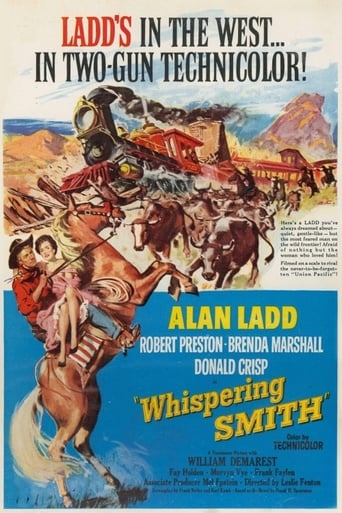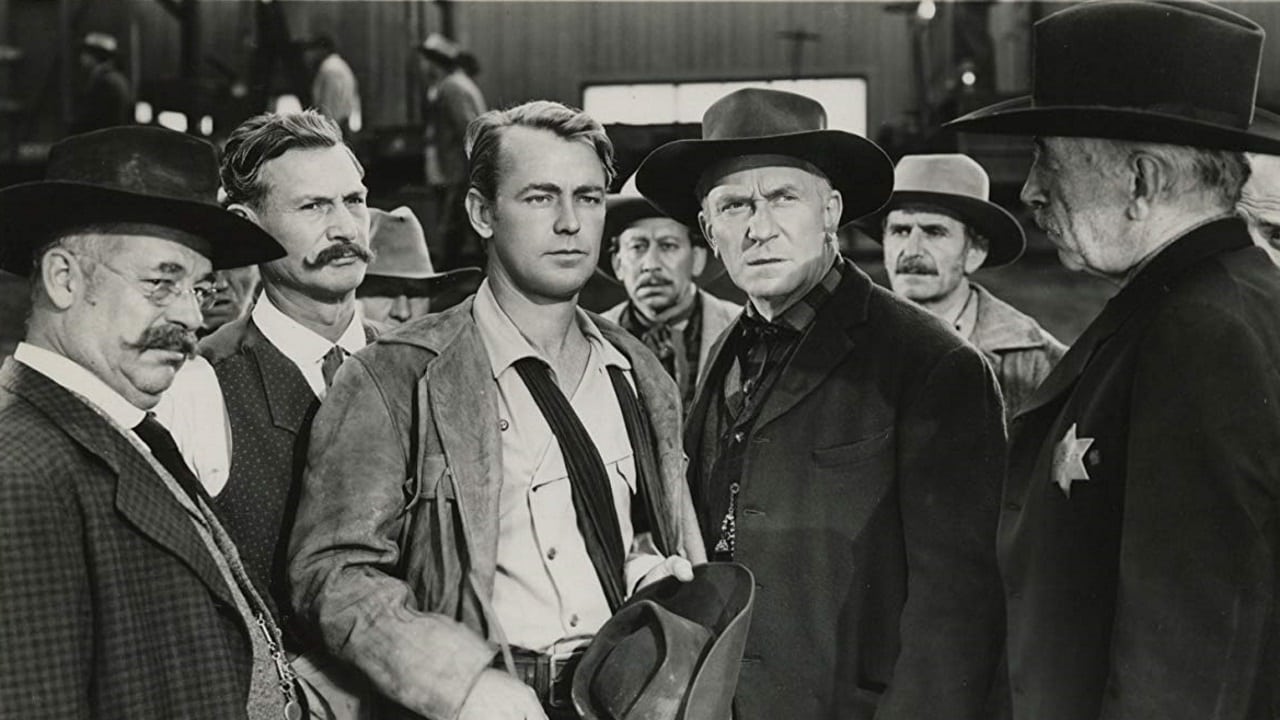Spikeopath
Whispering Smith is directed by Leslie Fenton and co-adapted to screenplay by Frank Butler and Karl Kamb from Frank H. Spearman's novel. It stars Alan Ladd, Robert Preston, Brenda Marshall, Donald Crisp, William Demarest and Frank Faylen. Music is by Adolph Deutsch and cinematography by Ray Rennahan.Famed railroad detective Whispering Smith (Ladd) becomes conflicted when his latest case pits him up against one of his best pals.It's somewhat surprising to find Whispering Smith is not more well known, given that it's Ladd's first full length Western feature and that it's really rather good. With its opening scene of Ladd riding towards camera, with glorious landscape in the background, and the thematics of how Smith operates around women and children, this signposts towards Shane five years down the line. In fact this very much works as a tasty appetiser for that superb 1953 picture.Ladd cuts a fine figure as Smith, giving him the right amount of calm toughness so as to not over play the role, and Preston is on fine form, very ebullient and able to act heaps with only his eyes. Marshall on the surface doesn't impact greatly, in what is a key role, but the character is very shrewdly written and sits in the story as more than a token. The villains headed by Crisp are not very inspiring, while Faylen looks laughably out of place with a blonde wig!, but with Preston erring on the side of badness the good versus bad axis of plotting thrives well enough.Pic is filled with a number of shoot-outs, banditry and awesome locomotive action, all set to the backdrop of beautiful - Technicolor enhanced - California locales. The running theme of railroad progression in the West is interestingly written, managing to not take sides and let the viewer enjoy both sides of the coin, though a moral equation that Smith ultimately arrives at doesn't quite add up. Add in Fenton's unfussy direction, Rennahan's location photography (see also night sequences) and Deutsch's pleasingly compliant score, and Western fans are good to go.This doesn't pull up any tress or have the psychological savvy of what many Oaters of the next decade would explore, but it's very well mounted and engages from the get go. 7/10
FilmFlaneur
OK, I am going to come right out and say it. I actually prefer this more muscular film to the (imho) considerably more self-conscious and portentous 'Shane'. The ever un-demonstrative Ladd has more of chance to breath here in an excellent, vigorous action story which involves him playing the eponymous railroad detective dogged with a secretly broken heart. Even with the constraints of the genre at this time and date the lead actor manages to find some depths and seriousness in a role which could easily have become a cliché. After foiling the predations of the notorious Barton gang, a wounded Whispering Smith finds himself back on home territory and being cared for by his one true love Marian (Brenda Sinclair) - who has meanwhile married his closest friend Murray (a splendidly tousle-haired Preston Foster). Murray meanwhile has problems on his own account after making some wrong choices when losing his job on the railroad, and grows increasingly closer to the crooked rancher Rebstock (Donald Crisp), eventually turning outlaw himself. Crisp, normally type-cast as the model of rectitude, here grabs the chance to appear menacing with both hands.What distinguished 'Whispering Smith' above all is the vital quality of the action sequences, particularly the opening railway robbery, which have a violent, modern air about them. Ladd is excellent as the introspective Legend of the Line, ably supported by a cast with no weaknesses. Only the requisite no-surprise hidden love subplot seems more of its time, although even this remains free of an obligatory happy ending and the expected clinch never materialises. Standout too are the accompanying cast: an excellent psychopathic sidekick 'Whitey' - Frank Faylan, an actor I was unfamiliar with - as well as the redoubtable William Demarest. Did he ever put in a bad supporting act? Interestingly the plot of 'Whispering Smith' features a number of train rides, virtually all of which are interrupted: sabotaged or hi-jacked. One can argue that this echoes the life of Smith himself, which has become a interrupted journey itself - a way of distraction, it is implied, from his romantic disappointments, as he's wedded to his dangerous job - a passage in life which never reaches any final, emotionally fulfilling destination. Director Fenton made 'The Streets of Laredo' with Holden immediately after this which, on this experience, I shall now seek out.The colour film appears these days on disc in an excellent print - it certainly looked good on a blu-ray player though a HD projector at 80", a highlight of a 3 disc DVD westerns box set I found cheap on Amazon. Recommended.
oldblackandwhite
Don't we all love trains? Railroads as a crucial element in the settlement of the West and the general prosperity of 19th century America seldom get their due in the western movie genre. Whispering Smith, a beautifully crafted 1948 Technicolor Allan Ladd vehicle, fills the gap nicely. Almost every character in this handsome horse opera -- or should I say "locomotive opera" -- makes his scratch either by working for the railroad or robbing it. The town saloon is called "The Roundhouse" and features a mural of a train coming. When soft-spoken, straight-shooting railroad detective Smith (Ladd) goes after the bad guys, he and the posse take a train with their horses riding penned flat cars.Frank H. Spearman's long, complex 1916 novel, which yours truly read as a youngster 50-some years ago, has been distilled down by the Frank Butler/Karl Kamb screenplay to concentrate on a love triangle of Smith, his good friend Murray (Robert Preston), and Murray's wife Marian (Brenda Marshall) who is Smith's lost love. Murray is a heel who doesn't deserve the pretty, gentle Marian. Even worse, when he gets fired from his job as foreman of the railroad wrecking crew, he becomes deeply and inextricably involved with a gang of rustlers, train robbers, and general baddies. Though Smith is very proper and stand-offish with Marian, it's obvious he still loves her. But she poorly hides her love for Smith, fueling Murray's volatile temper and wanton disposition with jealously.While there is plenty of action, Whispering Smith, like most of the better westerns, concentrates on character development, period color, and cinematography. Ladd, though known as a stone-face, was very expressive with his soulful eyes. He plays the stern, upright, and fearless, but friendly, kind, and loyal Smith to perfection. Preston, always fun to watch, essentially reprises his boisterous, happy-go-lucky good guy gone bad character from the even bigger and better train picture Union Pacific (1939). Brenda Marshall plays her tormented role with sensitivity, never forgetting that she is portraying a Victorian lady. In fact one of the charms of this movie is that little of the time period (1940's) in which it was made creeps in to spoil the late 19th century atmosphere. Thanks to the script and Leslie Fenton's expert direction, supporting and even minor characters show robust personalities. William Demarest as Smith's friend and the wrecking crew straw boss is allowed to play it straight, instead of hamming it up as he so often did, and he comes off very nicely. Donald Crisp, seldom a villain in the sound era, is colorful and dastardly as the smarmy, ruthless leader of the outlaw band. Frank Faylen gives a chilling performance as Crisp's main henchman Whitey, an evil, weird-looking albino. Kudos also to Fay Holden as Demarest's boarding house proprietress wife, who sings a duet on the porch with Ladd in a charming scene of 19th century Americana.The splendid three-strip Technicolor cinematography is provided by Ray Rennahan, who put on film a number of grander Technicolor oaters, such as the exotic Duel In The Sun (1946) and California (1946) (see my review), as well as another very interesting railroad epic The Denver And Rio Grand (1952) (see my review). He no doubt got much good advice, wanted or not. from the Technicolor Corporation's top adviser Natalie Kalmus. She had a reputation for intruding herself into set decoration and costuming, but she usually knew what she was doing. In Whispering Smith it seems everyone's revolver is a nickle-plated one, and the same can be seen in many of Natalie's Westerns. No doubt she thought the nickeled pistols looked prettier in Technicolor than the blue ones! Sets and decorations in this picture, provided by Sam Comer/Betram Granger, and costumes by Mary Kay Dodson are superb. My wife, who claims to know about such things, says the women's dresses were perfectly accurate to the time period.Editing was silky smooth as in most 'forties productions. All-important pacing was perfect. The story moved fast, but took plenty of breathers for color, character development, and tension building. Credit Fenton and editor Archie Marshek. My only complaint, and it is a minor one, is that Adolph Deutsch's score was perhaps slightly too pat and restrained. It was good, but could have been better. Western movies practically demand grand, operatic scores like those of Steiner and Tiompkin. They should be horse operas literally as well as figuratively!Colorful, authentic, thrilling, and dramatically absorbing, Whispering Smith is a top-notch, adult, "A" western, an under-appreciated classic from Hollywood's Golden Era.
bkoganbing
Alan Ladd's first starring western and first film in technicolor is Whispering Smith. I have a funny feeling that someone at Paramount figured out that in boots with a couple of inches of heels on them, Mr. Ladd could get some additional height unnoticed. He certainly did do a lot of westerns after Whispering Smith.According to the films of Alan Ladd and the biography by Beverly Linet, Ladd had purchased a ranch for his family and enjoyed his time out there and became an expert rider. For someone who arrived late to the western genre, Alan Ladd does sit the saddle well and looks right at home on the range.The story based on a novel by Frank Spearman had been filmed two times previously as a silent film. Ladd is a railroad detective and we first meet him going after Murvyn Vye and his two outlaw brothers. Ladd's best friend is Robert Preston and his wife Brenda Marshall almost married Ladd back in the day.Preston is a happy go lucky sort, but a lout none the less. The green eyed monster gets him though as Ladd is hanging around. Preston falls for the line that chief villain Donald Crisp gives him. Especially after he gets fired from the railroad after tangling with new superintendent John Eldredge. With his knowledge about the railroad, Preston becomes invaluable to Crisp.Whispering Smith is directed by Leslie Fenton, former actor who was gradually getting into A films, but he retired after directing only a few more films after this one. The character he creates for Ladd is a harbinger of the one that George Stevens did for Ladd in Shane. I have no doubt that Stevens cast Ladd in Shane after viewing Whispering Smith.And Whispering Smith probably would be considered a classic western if someone like George Stevens or John Ford or Anthony Mann had directed it. It's that good.Donald Crisp is a garrulous, but crafty outlaw leader. William Demarest is fine in the sidekick role. But the portrayal among the supporting cast to watch is Frank Faylen's as the albino killer in Crisp's gang. I also think that George Stevens was influenced in his direction of Jack Palance in Shane from Faylen's portrayal. Faylen has even less dialog than Palance did in Shane, but he will absolutely chill you when you watch the film.Whispering Smith is an absolute must for western fans and fans of Alan Ladd. It's a turning point film in his career and I'm glad it is finally out on DVD. Only wish a VHS version had been made of it.


 AD
AD



